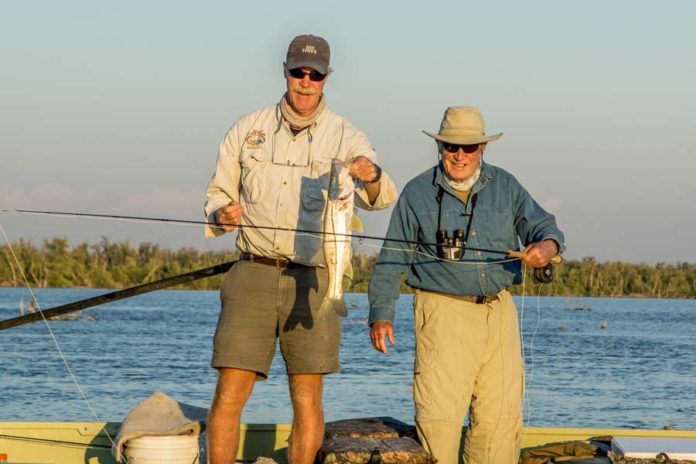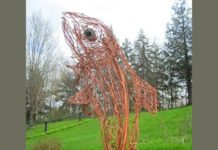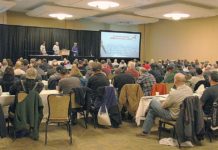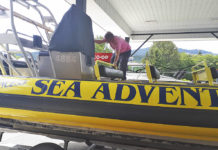Written by: Tom Rosenbauer
Photo by Tom Rosenbauer
There will be many fine tributes to Leigh H. Perkins written in the near future, as he had a larger-than-life influence on the worlds of fly fishing and habitat conservation. But I’d like to share more what he was like as a human being: what it was like to work for him, and also what he was like outside of the office because he was two very different people in those settings.
I started working for LHP when I was 22 years old, a wet-behind-the-ears kid who had a passion for fly fishing and who thought I knew way more than I did. I did not have much to offer Orvis besides a modest talent for fly-tying and a bachelor’s degree from the New York State College of Environmental Science and Forestry, which did impress Leigh because he always held anyone with scientific knowledge of the outdoors in high regard. That had more value to him than an MBA from Harvard.

Leigh was brutal in the office. He made all the decisions, mostly on gut feelings, and there was no arguing with him. He’d listen, but hardly ever changed his mind. You came to the office at 8 a.m. sharp, and you stayed until 5. And if you wanted to take a day off or even needed to leave an hour early, you had to get his approval. He loved a positive attitude. If you could keep your energy level steady and look at the sunny side of issues you’d do OK. Show any inkling of negativity and he’d be on you like a big brown trout on a crippled sculpin.
If you get the impression he was old school, you are correct. But it was the 1970s and having a boss who was the ultimate authority without the more considerate attitude accepted today was par for the course. I remember one time his son Perk charged me with investigating the possibility of a day care center for Orvis employees, hoping to attract some better talent to the backwaters of Vermont. LHP thought we were absolutely crazy and saw no value at all in the idea. He never told us not to do it, but when we never got it going I am sure he sat back in his chair and chuckled.

Photo by Tom Rosenbauer
Leigh and I agreed on most aspects of fly fishing and bird hunting but we never discussed politics or world events because we were quite far apart. Leigh was on the board of an organization that was promoting privatization of public land and seemed to be funneling big money behind the drive to overturn Montana’s public stream access law. On this issue the rest of the Orvis Company was strongly behind public access and it really heated up after Leigh retired and Perk was president. Leigh was still showing up on the organization’s web site as a board member and although intellectually I understood his view that private landowners can be the exemplary stewards of the resource it seemed contradictory that after all he had done for protection of habitat he was supporting an organization that wanted to lock more of it up. So I called him up one day and suggested that maybe they could at least take his name off the web site. I went into it from a business perspective rather than a personal one, telling him we were getting bad press from his visibility there. After I had said my piece there was silence. Then “I hear what you’re saying. But no.” It was one of my most uncomfortable moments with him. Other than the few times he threatened to fire me.
One of Leigh’s most admirable attributes was his inclination to give someone with promise but no experience or education in an area a big chance. Without him, I would never have become a writer, editor, photographer, merchant, analyst, or educator. He threw me into all of those areas, as he did many other people, and you’d go off the deep end and either swim or flounder. But at least you would get the chance. He was not one to hold people back if they wanted more.

Photo by Tom Rosenbauer
But it’s outside of the office that you saw the true LHP. One May I picked a bunch of morels on my lunch hour and brought them into his office as I knew he loved them. Here was a guy who had fished and hunted all over the world and had eaten meals in some of the finest places along the way and you would think I had brought him the crown jewels. “Are there more out there? Could you take me to pick some with you?” And off we went, on one of those rare and precious unplanned afternoons off. And when he got into the woods, he was like a little kid, giving his hearty chuckle every time he found one. Work was not mentioned once. He seemed to appreciate this walk in the local woods as much as a salmon fishing trip to Iceland.
On fishing and hunting trips, LHP was the consummate host. He would drink all the younger guys under the table, be the last one to go to bed, and the first one up in the morning, making breakfast and getting gear organized. He always made sure each and every person on a trip was happy and comfortable and he always cooked all the meals himself. There was not a pretentious bone in his body. He drove old Jeeps, covered with mud on the outside and on the inside, more muddy dog prints along with a generous sprinkling of duck and grouse feathers. If you ever met him on a trout stream or in a grouse covert you would never know he was wealthy or that he owned The Orvis Company.

Photo by Tom Rosenbauer
And he was always appreciative of anything you showed him in the field. I remember taking him once to catch smallmouth bass on a river in southern Vermont. The bass are not very large and the fishing not all that exciting, but he treated each little bass he caught, and the entire day, like someone who had been cooped up for a year and suddenly set free. Another time I took him off the coast of Cape Cod with guide I knew to chase big bluefish on poppers, in the years back in the 1980s when striped bass were apparitions that you heard about but never caught. Now an 18-pound bluefish on a Skipping Bug is exciting stuff for someone like me from landlocked Vermont, but LHP had been ion on the giant tarpon fishing in Homosassa when Steve Huff, Billy Pate, and Tom Evans were catching fish close to the 200-pound mark every season. Yet I don’t think he was any less excited over those fish than the world-record-class tarpon.
That was Leigh. He loved every second of life and fishing and hunting and doing good work for the natural world. I owe him so much and am sorry that I didn’t tell him that more often. His passing leaves a big hole in the lives of many people.

Read more about Leigh and his legacy here:
Credit: Source link































